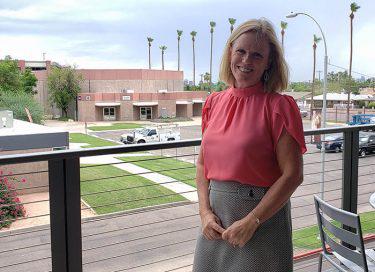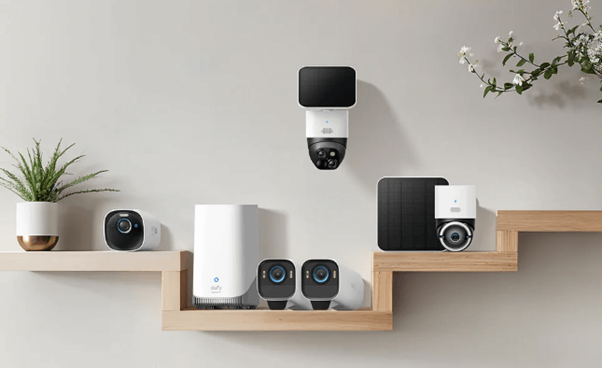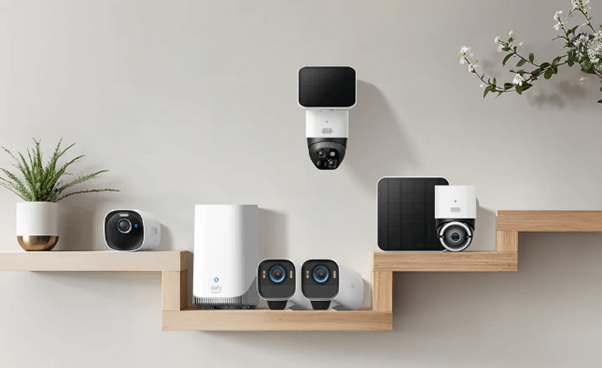Dr. Pam Rowland (left) and Dr. Brandy Harris, the new Technology Associate Dean and Assistant Dean, respectively, hit the ground running at this summer’s GenCyber camp for K12 teachers, which focused on cybersecurity. There’s much more to come for the new leaders as the 2021-22 academic year launches.
Story by Lana Sweeten-Shults
GCU News Bureau
Sometimes you don’t choose your story; sometimes it chooses you.
The story, in many ways, chose Dr. Pam Rowland, Grand Canyon University’s new Associate Dean of Computer Sciences and Technology. Although she earned her bachelor’s degree in commercial economics, it wasn’t economics she turned to when, in her 30s, after her children were creating their own plotlines, she paused, took a deep breath and then wondered: “What am I going to do with myself?”
Rowland taught at Dakota State University in Madison, South Dakota, before her move to GCU.
What she did, at a time when new technology in home and office computing was taking its first baby steps, was take baby steps right along with it.
“I taught myself Microsoft Office and just was loving it,” said Rowland, who has been learning the ropes of her new leadership role this summer alongside Dr. Brandy Harris, the College of Science, Engineering and Technology’s new Assistant Dean of Technology.
Rowland would dabble in teaching. When people found out she knew her way around Microsoft Office, they would ask for her help. “I’m in a small community, so I didn’t have to advertise. People just knew, ‘Hey, Pam might be available.’
“So I would do these Microsoft trainings for a company called Heartland Technologies where I would, four or five times a month, gather in a conference room with a company and teach their employees what to do with these new units they were given.”
She loved teaching so much she decided to pursue a master’s degree. She earned her master’s in information technology, started teaching entry-level technology courses at Dakota State University in Madison, South Dakota, where she’s from, and in her late 40s, decided to go for her doctorate.
“Interestingly enough, because I like teaching, I thought, I should get a teaching degree,” she said. But when she learned from university counselors that she would need to earn a second bachelor’s in teaching, she switched gears. “… They said, we have this new program called information technology.”
She just needed to take a couple of programming classes, and that was that — the beginning of a new chapter in her story.
Rowland went on to teach at Dakota State, digging her heels into various roles, including Assistant Professor of Cybersecurity, Director of the Center of Excellence for Computer Information Systems and Coordinator of the Master of Cyber Defense program.
“You often hear, do what you’re passionate about,” said Rowland, though she didn’t know she was passionate about technology until she started following a path she didn’t know she’d ever follow. “Sometimes you follow your path and you just GET passionate.”
What Rowland certainly became passionate about in her years of teaching technology is making sure girls can see that path — and follow it, if they, too, discover a passion they never knew they had.
Rowland co-founded CybHER, a program to get girls interested in cybersecurity. (Photo: PCmag.com)
One of the accomplishments she’s most proud of is cybher.org and the CybHER Security Institute at Dakota State, which she co-founded with Dr. Ashley Podhradsky.
The organization’s mission is to introduce more girls to cybersecurity and provide resources to them, from middle school through their college years.
“We found out that girls simply did not know what it was or how they could explore that area because they just weren’t given the information,” Harris said.
“And, also, you can’t be what you don’t see. They weren’t seeing women leaders in cybersecurity. They were seeing their moms as this or that, their aunts, their friends .. and not in technology,” said Rowland, who became familiar with GCU during visits to family in the Phoenix area.
A lack of women in cyber certainly isn’t the case at GCU, whose leadership includes not only Rowland but new Assistant Dean of Technology Dr. Brandy Harris.
Much like Rowland, Harris’ story early in her career didn’t include very many passages about technology or teaching.
Her bachelor’s degree is in music and theatre.
Harris started her career at GCU as a curriculum developer before becoming the Program Director for Technology and, now, Assistant Dean of that department.
“I had no intention of getting into education at all,” said Harris.
But then she got a job at Goodwill Industries as an outreach specialist. She worked with adults with disabilities, getting them job placement and teaching training classes. Then when she moved to Phoenix in 2002 from Michigan — “I’m pretty sure I’m allergic to snow,” she said with a laugh — she started working at a private special education school doing the same kind of work.

Those steps in her life led her to a 15-year career as a public-school teacher at the high school level.
“That’s my background — education and faculty training and working with teachers to improve their pedagogical skills. I don’t have the same industry background; I have teaching,” Harris said, though she is working on a Master of Science in Cybersecurity degree.
She made the decision after about a decade in teaching to go for her doctoral degree in Organizational Leadership at GCU to buoy her master’s in special education.
She remembers being on campus for an evening cohort. It was Halloween, “and there’s kids everywhere from the community. They just flooded the entire Quad, and every club had a booth out there where all of these kids were trick-or-treating.
“As a first-generation college student who grew up in poverty, this was AMAZING to me that all of these students were being brought onto a campus just for fun and to help them realize that they belong here. That they can be here, that this (college) can be an option for them.
“I fell in love with GCU at that moment and decided I wanted to work here because I believe so strongly in the community outreach that we do and trying to lift up a community that doesn’t always see the possibilities that are there.”
She firmly believes that education — and having someone who supports you in your educational journey — makes all the difference.
Harris (third row from the bottom, on the left) and Rowland (bottom row, on the right) with high school teachers at this summer’s GenCyber camp.
“That’s the only reason I made it to where I was,” Harris said. “My mom insisted education was the most important thing in my life. She would do my chores to make sure I had time to do my homework in order to support my academic success.”
Harris wants to be that type of support for the students at GCU — and has been since arriving on campus six years ago.
She started her career here as a curriculum designer in Curriculum Design and Development and ended up on the CSET team. When she moved up to a curriculum designer lead position, she focused on technology. She worked closely with the college’s previous dean, Dr. Heather Monthie, and got to know the team so well that Monthie moved her to CSET as the Program Director for Technology, a position she held for three years.
In her new role as Assistant Dean of Technology, she works closely with the faculty, interfaces with other departments at the University in day-to-day operations, and oversees curriculum.
And she works closely with Rowland, whose role is a little more outward facing. Rowland concentrates more on program and department expansion and focuses on industry connections.
Together, the two will be that force in Technology that pushes the department beyond its successes in the past couple of years.
In 2019, the National Security Agency and Department of Homeland Security awarded a prestigious designation to the IT-cybersecurity’s bachelor’s degree program, naming it a National Center of Academic Excellence in Cyber Defense Education. And in 2020, the bachelor’s degree program in Computer Science received a highly sought-after ABET accreditation.
Rowland and Harris are already helming some big changes.
Just across the hallway from their offices on the third floor of the Technology Building, crews are relocating the Cyber Center of Excellence, formerly in Building 66 at 27th Avenue. Some 44 new computers, along with new servers and the like will be ready to be fired up by the time students arrive for classes in the fall.
Talks are just beginning, too, for an Augmented Reality/Virtual Reality space that will tout five stations for visitors to experience students’ AR and VR projects.
“We’re building out our technology labs to be a bit more of a showpiece,” Harris said. “We’re doing such great things over here, but it’s sometimes hard to see. It isn’t a physical product, like the engineering team. If you’re writing this beautiful software, you can’t put that out on the Quad and show it off, so we are trying to build out the technology labs where we can really showcase the student work and show potential students what they can do when they come here.”
Added Rowland, “Brandy and I are on the same page when it comes to continuing to support and develop our faculty. The professional interests they have are high on our list.
“And we want to continue to seek national recognition for the programs that we have, and to really support our students on their journey toward their goals,” she said, whether that journey is a story they choose or, like Rowland and Harris, is a story that chooses them.
GCU senior writer Lana Sweeten-Shults can be reached at [email protected] or at 602-639-7901.
***
Related content:
GCU Today: GCU helps teachers boot up their cybersecurity skills
GCU Today: Technology Department awarded GenCyber grant
GCU Today: IT-cyber program gets NSA, DHS stamp of approval
GCU Today: Code Red: GCU powers up cybersecurity focus
GCU Today: GCU programs earn prestigious ABET accreditation




